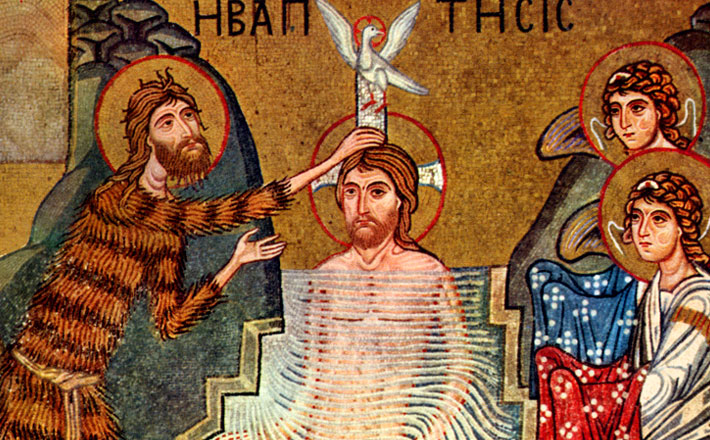Commentary on Mark 1:4-11
Mark is the only book in the Bible that announces itself as a “gospel” (Mark 1:1), the good news about Jesus, a verse read 5 weeks ago on the second Sunday of Advent.
There is no word in Mark about the birth or youth of Jesus. He starts right in with this “good news” of Jesus’ baptism as the beginning of his ministry. It is the fulfillment of the “messenger” promised by the prophet Isaiah (40:3. Malachi 3:1), a promise reiterated by John’s own explanation of Jesus’ baptism, that his baptism was with water, but “Jesus will baptize you with the Holy Spirit” (Mark 1:8).
A sermon on this text will begin with Jesus’ baptism, then move to our baptism.
John’s baptism had two components — repentance and forgiveness (Mark 1:4). As John explains what took place with Jesus, he adds that the baptism is not only with water, but with the Holy Spirit. Those elements are still true of baptism today. The baptismal liturgy marks the end of the old life (“Do you renounce … ”) and the beginning of a life lived in God’s grace and forgiveness. Then John adds a new component with the gift of the Holy Spirit, also part of our baptism service (“ … you have been sealed by the Holy Spirit … ”).
Later on, toward the close of his ministry, Jesus himself makes clear that baptism leads to a new way of life. When the brothers James and John ask to be seated next to Jesus in the life to come, Jesus points out that “the baptism with which I am baptized, you will be baptized” (Mark 10:39). To be baptized in Jesus is to follow him.
After Jesus finished with his life on this earth and his followers became the early Christian church, they developed what baptism means for us.
The process starts immediately at Pentecost, when God gives the disciples the gift of the Spirit to carry on this new life in Christ. After his sermon on Pentecost, the listeners ask the apostle Peter how they should respond, he answers with these same three components of baptism: “Repent and be baptized every one of you in the name of Jesus Christ so that your sins will be forgiven; and you will receive the gift of the Holy Spirit” (Acts 2:38).
As we continue in the New Testament, our understanding of what baptism means for us continues to unfold. It always follows faith — the faith of the person being baptized (Acts 8:13,36), or the faith of the parents (Acts 16:15, 30-33; 18:8, 1 Corinthians 1:16).
Following what Jesus said in Mark 10, in baptism we die, as Jesus did, but we are also raised to new life, as Jesus was (Romans 6:3-5, Colossians 2:12, Titus 3:5). This great promise has sustained Christians throughout the centuries. As Dietrich Bonhoeffer was led to his death, he said to one of the prison guards, “For some this is the end, but for me it is the beginning.” One of hymn writer John Ylvisaker’s hymns states, “You can’t kill me, I’ve already died.” We die in baptism, but we rise up to new life in Christ!
Furthermore, baptism is more than an individual act. In baptism we become part of a people. The Apostle Paul emphasizes how “we were all baptized into one body (1 Corinthians 12:13). Colossians 2:11,12 compares baptism with the Old Testament rite of circumcision, by which infants were made part of the people of the covenant.
The issue of infant baptism versus believer’s baptism is the fundamental division among churches of the Protestant Reformation. However, both sides agree that baptism is always done in faith — whether the faith of the person being baptized or the faith of those who bring somebody to be baptized. We also agree that children who have faith even before the age of their church’s baptism rite are indeed part of God’s people because of their faith.
The main thrust of today’s text and the meaning of Jesus’ baptism for us is that we are baptized into something. A fundamental change takes place in baptism, at whatever age. An adult who is baptized after accepting faith is changed, and an infant baptized into a family of faith will be brought up in that faith.
An adult who came to faith in our congregation argued that he didn’t need to be baptized because he was now saved through faith. Baptism, he said, “is just a rite; it doesn’t save us.” It was true, I told him, but I also told him that to have faith is to follow Jesus, and Jesus tells us to be baptized, just as he was baptized. He told his night-time visitor Nicodemus that “unless one is born of water and the Spirit, one cannot enter the kingdom of God” (John 3:5).
In baptism we become part of Christ’s body. Paul writes that “for by one Spirit we were all baptized into one body (1 Corinthians 12:13) and that “as many of you as were baptized into Christ have put on Christ” (Galatians 3:27).
In the letter to the Colossians we read “you were buried with him in baptism, in which you were also raised with him through faith in the working of God, who raised him from the dead (Colossians 2:11,12).
In his last conversation with his disciples, Jesus spoke again about baptism. He told them, “Go therefore and make disciples of all nations, baptizing them in the name of the Father and of the Son and of the Holy Spirit, and teaching them to obey everything that I have commanded you” (Matthew 28:19-20).
A person who had been baptized as a small infant once said to me, “As far as I’m concerned, nothing happened.” She did not have any memory of it, of course, but something dramatic happened, and her subsequent life as a Christian was proof of it.
We often speak of baptism as a “means of grace,” that is, one of the ways that God’s grace comes to us. Physically it’s only a small splash of water, but it marks the beginning of a whole new life — of forgiveness, of the presence of God’s Spirit, of our union with Jesus, and our becoming part of the world-wide Christian church!


January 11, 2015